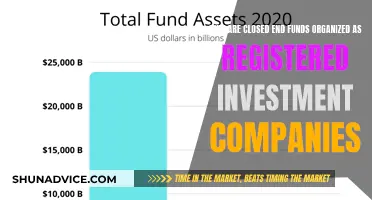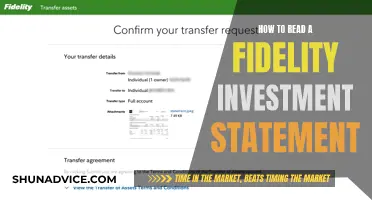
Index funds are a great investment for building wealth over the long term. They are a type of mutual fund or exchange-traded fund (ETF) that tracks the performance of a market index, such as the S&P 500, by holding the same stocks or bonds or a representative sample of them. Index funds are passive investments, meaning they don't require active management, which results in lower fees for investors.
Index funds are popular because they offer a simple, low-cost way to gain exposure to a broad, diversified portfolio. They are also tax-efficient, as they generate less taxable income than other types of funds. Over the long term, index funds have generally outperformed other types of mutual funds and are considered less risky due to their diversification.
When investing in index funds, it is important to consider factors such as the fund's expenses, taxes, investment minimums, and long-run performance. It is also crucial to understand the underlying index that the fund is tracking and ensure that it aligns with your investment goals and risk tolerance.
Overall, index funds are a smart investment choice for those looking for a simple, cost-effective way to build wealth over time.
| Characteristics | Values |
|---|---|
| Performance | Often outperform actively managed funds over the long term |
| Cost | Low fees |
| Risk | Less risky than individual stocks |
| Returns | Good for building wealth over the long term |
| Management | Passive management strategy |
| Taxes | More tax-efficient than actively managed funds |

Low fees
One of the most significant advantages of investing in index funds is their low fees. Index funds are passively managed, meaning they don't require active fund managers to analyse and pick stocks, conduct trades, or time the market. Instead, they are designed to mirror the performance of a specific market index, such as the S&P 500. This passive investment strategy leads to significantly lower management fees and transaction costs compared to actively managed funds.
Index funds have much lower expense ratios, which are fees subtracted from each shareholder's returns as a percentage of their overall investment. The expense ratios of index funds are often in the range of 0.03% to 0.095%, whereas actively managed funds typically charge higher fees, usually above 0.44% and sometimes exceeding 1.00%. These fractions of a percentage may seem negligible, but they can significantly impact long-term investment returns.
Additionally, index funds generate less taxable income. Since they trade less frequently than actively managed funds, they distribute fewer capital gains to shareholders, resulting in lower taxes. This further enhances the cost-effectiveness of index funds.
The low fees associated with index funds make them an attractive option for investors, particularly those focused on long-term wealth accumulation. By minimising costs, index funds enable investors to retain a larger portion of their returns, potentially leading to more substantial gains over time.
Pension Planning: Choosing the Right NPS Fund
You may want to see also

Passive management
Index funds are considered a passive management strategy. They don't require active decisions about which investments to buy or sell. Instead, they aim to mirror the performance of a designated market index, such as the S&P 500. This means that index funds don't try to beat the market but rather be the market.
Index funds are passively managed, meaning they don't have a fund manager actively trading or researching securities and making recommendations. Instead, the index fund's portfolio duplicates that of its designated index. This passive strategy results in lower management fees and transaction costs for index funds compared to actively managed funds.
The passive nature of index funds means they are less expensive to operate, which translates to lower fees for investors. Actively managed funds, on the other hand, have higher fees to cover the costs of research analysts, portfolio managers, and more frequent trades.
Index funds' passive management strategy also contributes to their tax efficiency. They generate less taxable income because they trade securities less frequently than actively managed funds. Additionally, index funds can choose from various lots when selling a particular security, allowing them to sell those with the lowest capital gains and minimise taxes.
While passive management offers many benefits, it's important to consider its limitations. One drawback is the lack of downside protection; in prolonged market downturns, index funds can perform poorly, mirroring the broader market's decline. Another limitation is the inability to take advantage of specific investment opportunities or trim underperforming assets.
In summary, the passive management of index funds leads to lower fees, reduced transaction costs, and tax efficiency. However, it also means that index funds are more susceptible to market downturns and may not be able to capitalise on short-term opportunities or actively manage underperforming assets.
Proprietary Funds: Risky Business for Investors
You may want to see also

Long-term performance
Index funds are a great investment for building wealth over the long term. Here are some reasons why they are a smart choice for investors:
Index funds have consistently outperformed other types of funds in terms of total return over the long term. This is mainly due to their much lower management fees. Instead of having a manager actively trading, and a research team analyzing securities and making recommendations, the index fund’s portfolio just duplicates that of its designated index. This passive management strategy means lower costs, which can make a significant difference in returns over time.
Index funds also have lower transaction costs as they hold investments until the index itself changes, which doesn't happen very often. They also trade in and out of securities less frequently than actively managed funds, generating less taxable income that must be passed on to shareholders. This makes them more tax-efficient.
The broad diversification of index funds also helps to smooth out volatility and reduce risk. While individual stocks may rise and fall, indexes tend to rise over time. The S&P 500, for example, has posted an average annual return of nearly 10% since 1928.
Over the past 15 years, about 9 out of 10 actively managed funds didn't match the returns of the S&P 500 benchmark. In 2021, only 9% of actively managed funds beat their benchmark. This underperformance is largely due to the higher fees associated with active management.
Index funds are a simple, cost-effective way to hold a broad range of stocks or bonds that mirror a specific benchmark index, making them a solid choice for both beginner and expert investors.
TSP L Funds: Choosing the Right Investment for You
You may want to see also

Tax efficiency
Index funds are considered tax-efficient for several reasons. Firstly, they replicate the holdings of an index, so they don't trade securities as frequently as actively managed funds, reducing taxable gains. Index funds also have a low turnover ratio, meaning they sell securities less often, minimising capital gains taxes.
When comparing ETFs and mutual funds, ETFs are generally more tax-efficient due to their structure, which minimises taxes for the holder. ETFs create or redeem "creation units" to accommodate investment inflows and outflows, reducing the likelihood of individual investors incurring capital gains taxes.
Additionally, the way ETFs trade provides them with an extra tax benefit. When investors sell ETF shares, they sell to another buyer instead of the fund company, meaning the fund itself isn't involved in the transaction and doesn't have to sell securities, avoiding potential capital gains.
Index funds are also considered tax-efficient because they produce lower dividends than actively managed funds, and these dividends are often qualified dividends, which are taxed at a lower rate.
Overall, by reducing taxable gains, minimising capital gains taxes, and generating lower dividends, index funds can help investors lower their tax bills and retain more of their investment returns.
Vanguard Funds: Exploring India-Centric Investment Opportunities
You may want to see also

Diversification
- Risk Reduction: By investing in a wide range of companies across different sectors and asset classes, index funds reduce the risk associated with individual stock ownership. If a single company performs poorly, it will have a minimal impact on the overall index fund.
- Broad Market Exposure: Index funds provide exposure to a broad market index, allowing investors to track the performance of the overall market rather than specific stocks. This diversification ensures that investors benefit from the positive performance of multiple sectors and industries.
- Long-Term Returns: Historically, major indexes have delivered solid long-term returns. For example, the S&P 500 has averaged an annual return of about 10% over the long term. While index funds may fluctuate in the short term, their diversification tends to provide more stable returns over time.
- Low Correlation: Index funds that track different indexes often have low correlations with each other. For example, an S&P 500 index fund may have a low correlation with a Nasdaq-100 index fund. This low correlation means that the performance of one index fund is not highly dependent on the performance of another, providing investors with a more diversified portfolio.
- Customization: While index funds offer immediate diversification, investors can further customize their portfolios by selecting index funds that focus on specific industries, countries, or investment styles. This allows investors to target specific market opportunities while maintaining a diversified approach.
American Funds: The Investment Agent's Favorite Choice Explained
You may want to see also
Frequently asked questions
Index funds are a low-cost, easy way to build wealth. They are a great investment for building wealth over the long term, which is why they are popular with retirement investors. They are also tax-efficient, have low fees, and often perform better than actively managed funds over the long term.
You can invest in index funds by opening and funding a brokerage account. You can then use this to buy shares of an index fund.
Some good index funds to invest in include:
- Fidelity ZERO Large Cap Index
- Vanguard S&P 500 ETF
- SPDR S&P 500 ETF Trust
- iShares Core S&P 500 ETF
- Schwab S&P 500 Index Fund







